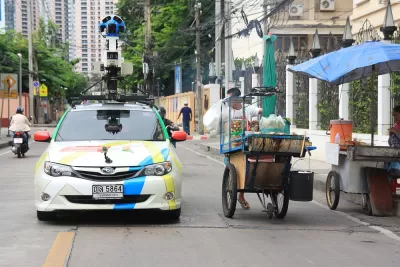At this time of year, many prospective graduate students are asking themselves if they should apply to planning programs. This is a good question. Planning is a diverse field and it can be hard to figure out if it will be the right fit.

At this time of year, many prospective graduate students are asking themselves if they should apply to planning programs. This is a good question. Planning is a diverse field and it can be hard to figure out if it will be the right fit.
Some years ago a committee of the Association of Collegiate Schools of Planning, let by Professor Dowell Myers, developed the “anchor points for planning’s identification.” This paper identifies six core themes in planning, which parallel many of the reasons people choose planning as a career. They provide a good starting point for prospective students. They include:
- Improving human settlements. This involves understanding and influencing physical, social, and economic dimensions with an emphasis on serving people’s needs. For many planning can help create better places in the here and now—more delightful and supportive, more just and efficient.
- Making connections. Planners can link sectors like transportation and housing, or public and private “enterprises.” This is part of what makes planning so important and difficult—as generalists with a specialty planners understand the broad picture while also specializing in some topical areas. We work at multiple scales, on multiple issues, with multiple publics. In a world calling for more work across disciplines, planning has an edge.
- Dealing with the future and “pathways of change.” We are in difficult times with a great many changes likely in the next 50 years—ecological, demographic, economic, in terms or city growth and shrinkage. Planning’s focus on the long-term provides a powerful lens for assessing current actions. Planners have decades of experience of getting predictions right and wrong; of developing plausible scenarios for possible futures. This is an area for growth.
- Identifying diverse needs and how they play out in human settlements. This is a fundamentally ethical issue. Planners care about who gets what in material terms. But also how to support diverse sets of values and meanings in a way that fair to all in the long term. Planning’s ethical commitment to social justice is the reason many come to the field.
- Engaging “open participation in decision making.” This is about finding appropriate ways to incorporate diverse perspectives in often complex decision making using a variety of techniques that respect people’s time and values. Such processes are not simple and raise large ethical questions that can fill a career.
- Linking knowledge to action. The topic of implementation is front and center for planning. Planning uses diverse tools to get things done—building things, financing improvements, regulating change, incentivizing innovations, educating key stakeholders, negotiating agreements, and so on. This big tool kit can attract many to planning.
These are all important reasons to plan—they manage change in complicated situations at multiple scales over time. This can be portrayed as being too fragmented to some, but those who choose planning do so because they seed the benefits of a comprehensive, plural, ethical, future-oriented, humane field.
From 2007 through December 2012 I wrote monthly blogs. For the last two years as a program director I have been so busy dealing with my own students it has been hard to read beyond them—so I’ve only blogged a few times. But now I really am back to blogging and will start again with my monthly blogs focused on the intersections between education, planning, and urbanization.

Maui's Vacation Rental Debate Turns Ugly
Verbal attacks, misinformation campaigns and fistfights plague a high-stakes debate to convert thousands of vacation rentals into long-term housing.

Planetizen Federal Action Tracker
A weekly monitor of how Trump’s orders and actions are impacting planners and planning in America.

San Francisco Suspends Traffic Calming Amidst Record Deaths
Citing “a challenging fiscal landscape,” the city will cease the program on the heels of 42 traffic deaths, including 24 pedestrians.

Defunct Pittsburgh Power Plant to Become Residential Tower
A decommissioned steam heat plant will be redeveloped into almost 100 affordable housing units.

Trump Prompts Restructuring of Transportation Research Board in “Unprecedented Overreach”
The TRB has eliminated more than half of its committees including those focused on climate, equity, and cities.

Amtrak Rolls Out New Orleans to Alabama “Mardi Gras” Train
The new service will operate morning and evening departures between Mobile and New Orleans.
Urban Design for Planners 1: Software Tools
This six-course series explores essential urban design concepts using open source software and equips planners with the tools they need to participate fully in the urban design process.
Planning for Universal Design
Learn the tools for implementing Universal Design in planning regulations.
Heyer Gruel & Associates PA
JM Goldson LLC
Custer County Colorado
City of Camden Redevelopment Agency
City of Astoria
Transportation Research & Education Center (TREC) at Portland State University
Jefferson Parish Government
Camden Redevelopment Agency
City of Claremont






























